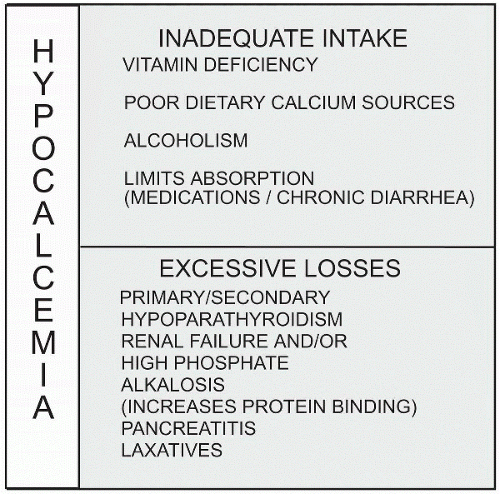Hypocalcemia
QUICK LOOK AT THE CHAPTER AHEAD
Normal calcium exchange in the blood is controlled by the parathyroid hormone. Hypocalcemia results when the calcium level falls below 8.5 mg/dL or 4.5 mEq/L. Hypocalcemic states occur through excessive loss of calcium from the body, either from a lack of ingestion or absorption of the mineral. In this chapter we discuss the many causes of hypocalcemia as well as manifestations and treatment.
Normally, calcium is extracted from the bone and replaced on a daily basis. In addition, the amount of calcium that is absorbed from the intestine is matched by that excreted through the kidneys. All of this calcium exchange is controlled by the parathyroid hormone. Hypocalcemia results when the calcium level falls below 8.5 mg/dL or 4.5 mEq/L. Hypocalcemic states occur through excessive loss of calcium from the body, from either a lack of ingestion or absorption of the mineral. Alcoholics are particularly prone to developing hypocalcemia secondary to a lack of intake and poor absorption related to a malnourished state (Table 19-1).
Pancreatitis can result in hypocalcemia due to a decreased absorption and an increased excretion of calcium. Pancreatitis results in a decrease in pancreatic lipase, which normally helps with the digestion of
dietary fats. Because the fats cannot be absorbed, calcium from the diet and that secreted into the intestine cannot be absorbed. Instead, calcium is bound to the undigested fat and excreted from the body.
dietary fats. Because the fats cannot be absorbed, calcium from the diet and that secreted into the intestine cannot be absorbed. Instead, calcium is bound to the undigested fat and excreted from the body.
Table 19-1 Causes of Hypocalcemia | ||||||||||||||||||||||||||||||||||||||||||
|---|---|---|---|---|---|---|---|---|---|---|---|---|---|---|---|---|---|---|---|---|---|---|---|---|---|---|---|---|---|---|---|---|---|---|---|---|---|---|---|---|---|---|
| ||||||||||||||||||||||||||||||||||||||||||
Stay updated, free articles. Join our Telegram channel

Full access? Get Clinical Tree




